WIE Camp 2014: Creating Community for Female Engineering Students
August 25, 2014
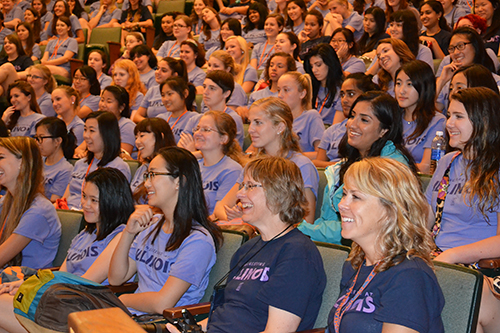
Bottom center and right: Dean Susan Larson, WIE Director and Angie Wolters, WIE Assistant Director, along with a number of WIE campers, appreciate Gretchen Adams and Don Decoste's antics during their Chemistry Demo.
Dean Susan Larson recalls that when she took over as the Director of Women in Engineering (WIE) in 2003, she thought, "The women need something to get started. They're a minority, but if they know one another, they'll be ok. They'll form a community; they'll make those connections." So, hoping to "bring them all together to get to know one another and get to know the campus and some of the instructors and advisors here," she started WIE Camp.
Still going strong in its 12th year, the 2014 WIE Camp did all that Larson originally envisioned as 255 female engineering students arrived on campus for freshman orientation. The camp's activities, while fun, were designed to foster community building and to help the girls establish a support system as they built key relationships and learned about campus supports available.
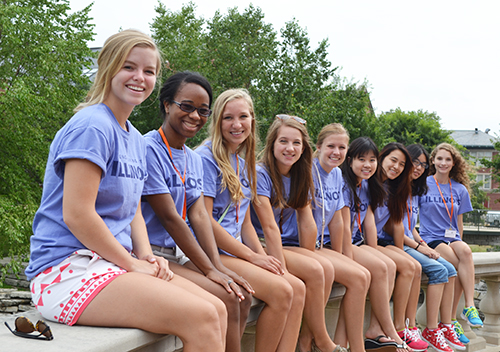
WIE campers on the scavenger hunt take a brief break on the portico behind Engineering Hall.
For example, a trip to the Challenge Course at Allerton Park's 4-H Memorial Camp emphasized team concepts needed to succeed in college. A scavenger hunt to places such as Engineering Hall's advising office and the Undergraduate Library helped familiarize girls with campus. During their highly entertaining Chemistry demo, Gretchen Adams and Don Decoste interjected key dos and don'ts designed to help campers adjust to life as college students.
The all-time high number of 255 campers reflects the increased number of women accepting admission to the Engineering in 2014 (a 27% increase over the last two years). In fact, Engineering has dubbed 2014, "The Year of the Woman."
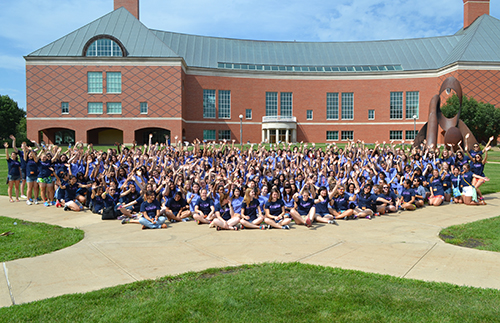
2014 WIE campers, counselors, and directors on the Engineering Quad.
Faced with what WIE Assistant Director Angie Wolters called, "this amazing problem of so many girls," camp organizers worked hard to make the big group feel small so girls could make connections.
"Because we have such a large number, we're doing some things this year to make it feel smaller," admits Wolters. For example, girls ate lunch with others from their department; ate dinner with girls from their residence halls; and rotations on the Challenge Course were also with girls in their major.
The camp also introduced girls to key people they can contact for help or advice, such as Larson and Wolters. "So they know we're here," stresses Wolters, "and we're housed in Engineering Hall, and we're a resource for them." Other role models were WIE Camp's three student coordinators, plus 43 counselors, who each acted as a mentor and guide to around five or six campers.
Meet the 2014 WIE Camp Student Coordinators
.jpg)
Left to right: 2014 WIE Camp Student Coordinators Danielle Tene, Lauren Milling, and Sarah Laken; WIE administrative assistant Robin Ennis; and WIE Assistand Director Angie Wolters.
All three 2014 student coordinators, Sarah Laken, Lauren Milling, and Danielle Tene, attended WIE camp as freshmen, plus were counselors in previous camps. "So it's not only Dean Larson and myself in front of the girls," says Wolters, "but they see these girls, who not only share the information about what we're doing for the day, but they're walking up to them and talking to them and taking their hand when they need it."
Wolters says the three seniors were chosen because they're great leaders: "Each year, I'm looking at who's involved, and who serves as great role models for the girls, and who steps up. These are the three that would see a girl sitting by themselves and approach them to get that student involved."
Plus, Wolters hopes the freshmen will look up to these girls as role models that they can emulate:
"They're all great leaders in their own way, and that's what we want the girls who are attending to see—that they have those same kinds of opportunities. That's one of those things we want them to walk away from WIE Camp knowing about—what it is you can get involved in; how you can lead; how you can make a difference; what is your story at Illinois going to be? For these girls, part of their story is WIE Camp."
Danielle Tene, in Mechanical Engineering, reports that she and the other student coordinators accepted the challenge because: "We just loved it so much that we had to help come run it ourselves. It's also been changing a lot over the past few years, so it's exciting to get to play a role in that."
Part of the draw for Tene was to leave a legacy: "I'm naturally a person who wants to contribute and leave my mark on the College before I leave," but also because of the camp's impact on her own Illinois experience: "It helped me so much developing my relationships throughout college; I just knew how unique that made my experience in college."
Tene has wanted to be a student coordinator since last year's camp: "That's when I decided I could really do this; I could be that loud person who tells people where to go. But it was mostly last year, deciding to be a counselor out of wanting to do it rather than moving to the dorms early."
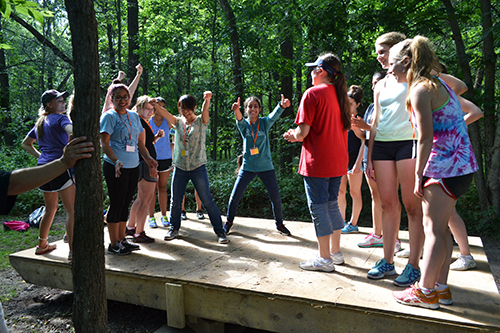
After a great deal of trial and error, the campers at the "Whale Watch" station celebrate successfully keeping the wooden platform balanced.
When the coordinators were freshmen, WIE Camp acted as sort of an "icebreaker," helping them meet people and develop relationships, particularly for Danielle Tene, who matriculated from California.
"I met everybody that I know in college somehow through WIE Camp," admits Tene. "I'm an out-of-state student, so it really helped me to move in early; it really helped me get acclimated to campus, a new state, and an entirely new atmosphere. I felt like it helped having a smaller social group that I knew that I was a part of and that I had support in, and that I could navigate the experience of living here before I had to deal with school."
In fact, Tene met one of her best friends at WIE Camp, and more importantly, met her boyfriend (since freshman year) through a girl she met at WIE Camp." "So that worked out well." She also knows "a ton" of study buddies and girls in her major courtesy of WIE camp.
Co-student coordinator Lauren Milling, a Bioengineering major from Chicago's northern suburbs knew "a ton of people" at Illinois as an incoming freshman, so WIE Camp was "a great opportunity for me to break out of the shell that I thought I was going to be put into here, coming and knowing so many people. So it was a good chance for me to make friends with other women in Engineering...so that I had other people to go to besides these really intimidating people that I already knew coming here."
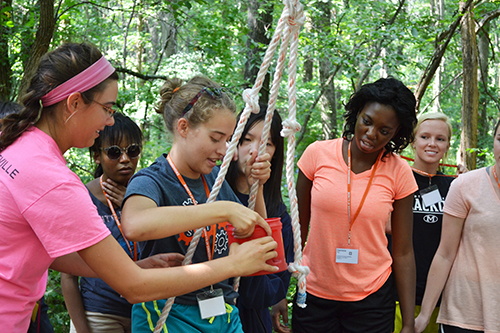
At the "Tarzan" station, a camper tries to secure the "cure for cancer" and successfully swing to the other side.
Unlike Tene, Milling didn't meet her BFF at camp: "I can't say there's one specific person that, ‘Oh, we became best friends at WIE Camp!'" However, she still believes the camp had an impact. "I know many of my relationships are based off of seeing a familiar face from WIE Camp…it definitely impacts many people, whether or not they found their best friend or it just helps find a familiar face in each class."
Sarah Laken, the third student coordinator, is also in Bioengineering. Does she remember Milling from WIE Camp? Nope. (But in her defense, BioE has lots of women.) Laken recalls the department lunch on the second day: "I remember, we were in this big room, and we went around the room and everybody said their names…but after that lunch, I wouldn't have been able to tell you names. Similar to Lauren, I was able to recognize people in classes, and that helped make a big impact in just becoming more comfortable with adjusting to college."
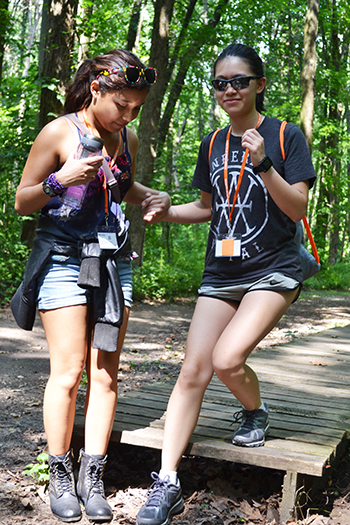
During the "Faith Walk," the camper who is not allowed to speak successfully helps the one who must keep her eyes closed to navigate the end of a wooden walkway.
However, Laken did meet her roommie through Camp: "It was at breakfast on Monday," "she reminisces. "We sat down next to each other, bonded over our love for Disney movies and coloring books. It turned out she was living next door to me in the dorms that first year, and we've been roommates ever since."
The idea of WIE Camp helping the girls to identify their support system is something Dean Larson had in mind when she created it.
"I hope that the students participating in WIE Camp get to know somebody they'll be friends with the four years that they're here," says Larson. "I hope that when they walk into their first class, they will know someone in that class. Because I think anything the College can do to help build community aids in their transition to college and adds to their success."
This happened for Tene, who describes the paradigm shift she experienced: "You have this feeling like, ‘I'm gonna' be the only girl in all my classes.' But then you get to WIE Camp, and there are hundreds of girls standing next to you, and you actually see in front of you all of these girls who are going to be with you in your four-year experience. So it's really cool to be able to visually see that support system going in in the first couple of days."
Though camp only lasts a few days, its impact precedes it…and continues long after it's over, both via Facebook and face-to-face mentoring. The student coordinators created a Facebook community well in advance of camp; then began mentoring the incoming freshmen, answering myriads of questions like: "What do I bring?" What kind of computer?" "Do I need this?" "Do I have to buy my books now?"
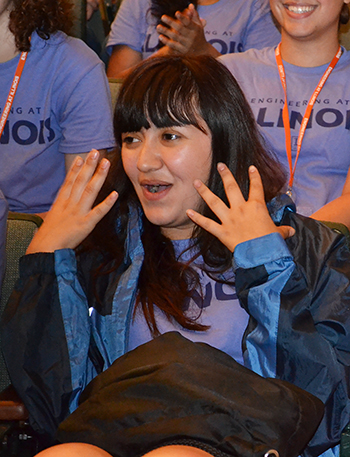
A camper enjoying the Chemistry Demo.
"So all of those fears," explains Wolters, "and those lingering questions, they've been asking and using these girls as resources already."
And the Facebook and mentoring will continue indefinitely. For example, this year, Tene is rooming with two girls she counselled at Camp last year.
"Our friendship was definitely built on them still reaching out to me after WIE Camp was over." The girls would continually beg, ‘We'll take you to the dorms for lunch; just come and help us with our homework.' ‘Tell me what to take next semester; am I doing it right?' ‘Does my four-year plan look ok?' All of these questions that they do have," Tene admits, "and they have a personal mentor now that they've accessed through WIE Camp."
And Tene says counsellors also reap some benefits: "Even as a counselor, you continue to make friends; you continue to expand your network; so it's not only benefitting the freshmen. It's not a one-way street; it's a two-way street."
Incoming Freshmen Value Exposure to Mentors
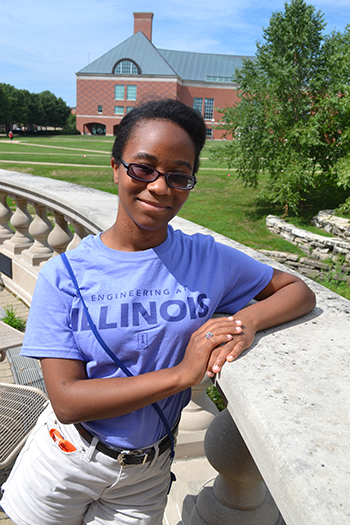
WIE camper Sydney Guillory, an incoming freshman who is majoring in Industrial Engineering.
One incoming freshman who values both mentoring and peer relationships is Sydney Guillory from Chicago. Having participated in programs encouraging women in engineering, Guillory says, "I always found it a good way to meet other women who are more experienced. You have the students who are older and who have been through it, and you also have the teachers, so you get to meet a lot of possible mentors and people who have a lot more experience than you, and you also get to meet other students who are like you, who are just starting out. I feel like I get a lot of different experiences through them, seeing what they all can bring to the table, and I feel like I learn more."
So Guillory appreciates WIE Camp's community-building opportunities: "This is a good foundation for the rest of your educational career here. There are about 250 girls in the program, so you have the potential to meet 250 of the freshmen. And they're people who have similar interests, because they're all interested in engineering. And you meet people who are specifically in your major…because of these two days, I got to meet ten other girls."
Guillory especially appreciated the departmental luncheon and interacting with the department heads. "Which is actually really incredible, because we got a lot of advice...We got to ask general questions about the college and university; we also got to ask specific questions." For example, they learned some career options they might have as industrial engineers.
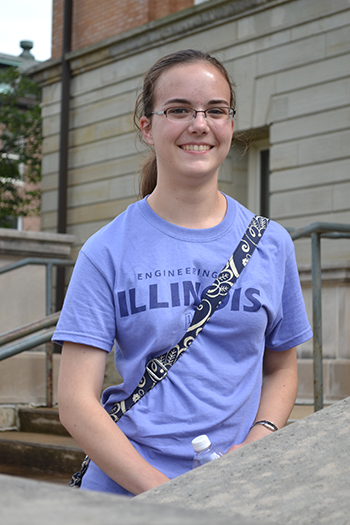
Shannon Strum, a Computer Science major from Villa Park, Illinois.
Did Guillory establish the support system she was hoping for? "I think this gave us an opportunity to build a community of our own within a giant campus."
Like Guillory, Shannon Strum also wanted a head start on her support system. "I wanted to get more acquainted with the engineering students here and start to build study groups and communities among the women here that are majoring in engineering." Strum also met some girls in her major: "so that helped me to start to learn their names and what they're like," which would help in building study groups. She adds, "I think it's going to be a great four years and a good experience here at Illinois."
As alluded to earlier by Tene, the idea of early move-in being an incentive for attending WIE Camp is a recurring theme. Campers, counselors, and student coordinators alike admit it's one of the perks—circumventing the chaos of the all-campus move-in day when thousands of students (with their parents and all their stuff) invade campus.
For example, when asked why she came to WIE Camp this summer, Mechanical Engineering freshman Kayleigh Neinzen shamelessly quipped, "First of all, early move-in," adding, "It's a really good bonus to beat the hassle."
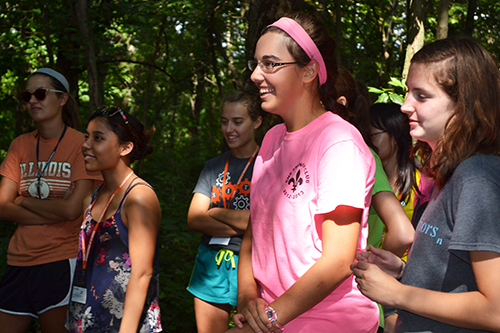
Kayliegh Neinzen (center, in pink) and her teammates enjoying the "Tarzan" station on the Challenge Course. The objective is to get all of the campers across from one side of an imaginary body of water to the other side, also safely transporting a "cure for cancer" (water in a plastic container) without spilling it or without anyone falling into the water.
However, that wasn't her main reason. Like Guillory and Strum, Neinzen appreciated picking the brains of more experienced folks during camp. "It was definitely a great experience—especially to talk to some of my professors, and talking to and actually getting to know some sophomores, juniors, and seniors." She evidently quizzed them about: "Hey, where's recycling? I have no idea," and "How do you take notes in class?" and "What's the best schedule like?"
"I didn't know I would be learning all of this in WIE camp, and I did," admits Neinzen.
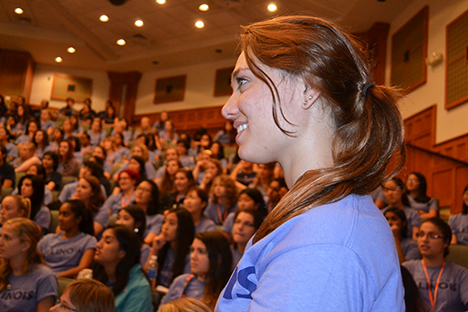
A WIE camper waits to help Gretchen Adams in one of the activities at the Chemistry Demo.
She also hoped to network: "I just really wanted to meet new people. Coming from the south (Edwardsville, Illinois), I don't really know anyone." Neinzen shared her agenda for Camp: "Ok, I really need to make new friends, to definitely get into the research groups, to make new contacts, get prepped up for 4+ years of learning."
And WIE camp helped with that: "I definitely feel like I'm starting that. I just need to tie the knots a little tighter—get to know them more." Neinzen envisions this future scenario upon encountering a fellow WIE-camper, ‘Hey, I remember you! Let's maybe get together.'"
In fact, she and a couple of dorm-mates are already planning a Star Wars marathon for her roommate from India and some other internationals who've never seen the popular sci-fi classics.
Just before WIE Camp 2014 began, its organizers expressed what they hoped campers would take away from the experience.
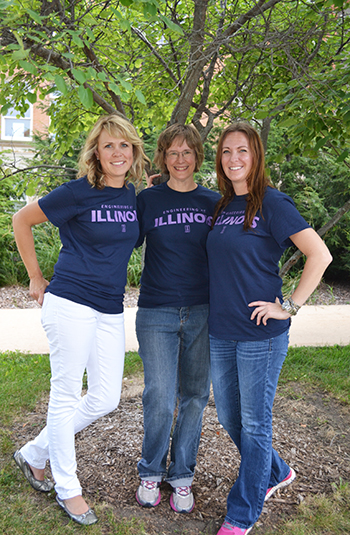
Left to right: WIE Assistant Director Angie Wolters; Dean Susan Larson, WIE Director; and Robin Ennis, WIE administrative assistant.
"I'm just hoping that they take the time to relax and settle in a little bit before having to be thrown into classes," says Milling. "And I hope that they're able to make a few connections with other people, recognize a couple of faces during their first days of classes. They may or may not meet their best friend there, but I'm just hoping it makes them feel more comfortable."
Admitting that she wasn't super excited to come to Illinois (which elicited a chorus of boos from fellow student coordinators), Laken says WIE Camp got her excited.
"I know. I know," she continues. "Now I can't imagine being anywhere else, but as a freshman going in, I was just really overwhelmed. It definitely got me excited about being here on campus, made me realize all the different opportunities there are here, so I'm hoping that other girls have a similar experience where they get really excited to be here."
Robin Ennis, WIE staff member who has been helping administer the camp, hopes it provides incoming freshmen what she missed when she was in college. "It's something I wish I had when I was in college…I came from out of state too and didn't know anyone, and it's so overwhelming. So I think it's a better experience to mix with the girls and have fun and get to know people." She also appreciates that students can "ask the questions that you're too embarrassed to ask someone else, like ‘How do I take the bus?' or just simple things that you wouldn't think you'd need to know coming to school."
Tene hopes the campers leave feeling like she did: "I really left WIE Camp with this feeling like, ‘I can do this. I can succeed at Illinois because of what I've been shown in these past few days, and I knew where to ask my questions, and I think that's what really helped me. So I just hope that all of our girls get that experience."
Story and photos by Elizabeth Innes, Communications Specialist, I-STEM Education Initiative
More: Summer Camp, Undergrad Education Reform, Women in Engineering, Women in STEM, 2014
For additional I-STEM articles about WIE Camp, see:
- Women in Engineering Camp Facilitates Relationship Building
- From WIE Camp to Seniors: Two Future Engineers Credit Illinois' Community of Support
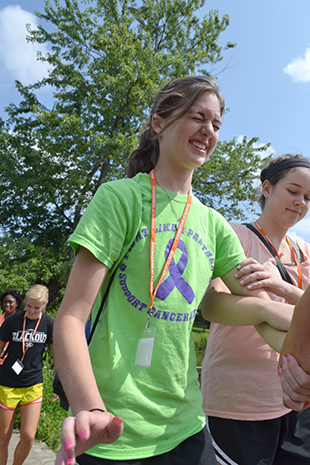
During the "Faith Walk" exercise, the WIE camper who must keep her eyes shut is led across a bridge by her partner who cannot speak to give her instructions.
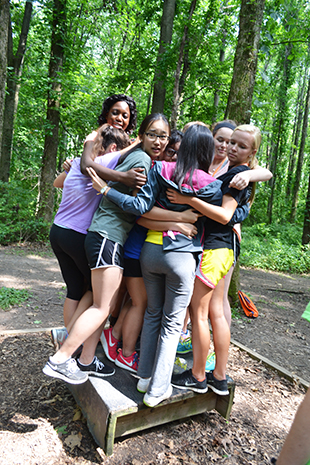
Campers at the "Sardines" station try to figure out how to get all of their group onto the platform without breaking any of the rules.
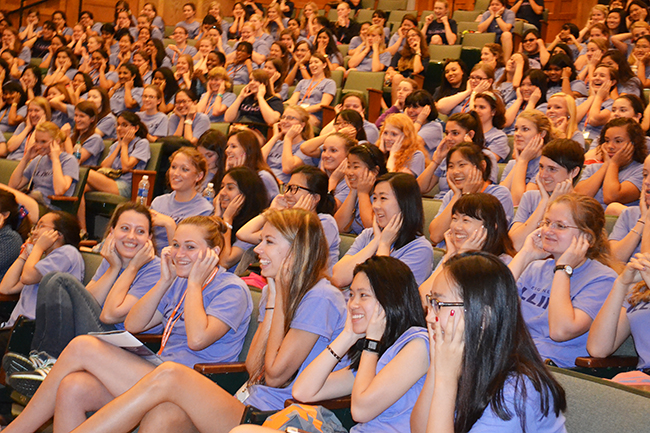
WIE campers plug their ears in anticipation of a loud noise during the Chemistry Demo by Gretchen Adams and Don Decoste near the end of the camp.
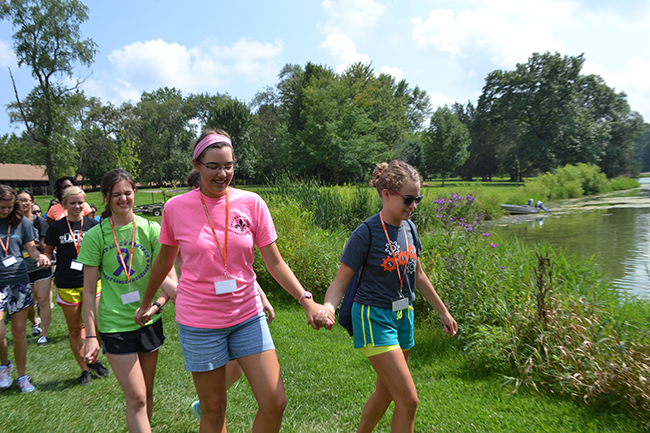
Campers participate in a "Faith Walk" during the Challenge Course at Allerton Park 4-H Memorial Camp.Girls were paired up by twos, one was to keep their eyes shut and be led by her partner, who was not allowed to speak during the exercise.













.jpg)
















